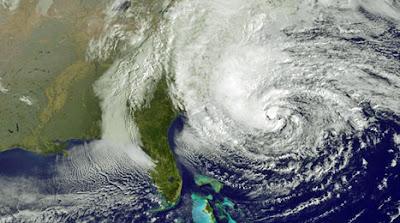Monday, October 29, 2012
Supper typhoon Sandy: Airlines cancel flights, New York shuts down
Hurricane Sandy is due to hit the areas between Boston, New York, and Washington DC overnight Monday local time, with typhoon-strength gales, heavy rain, tidal flooding, and even snow forecast as the storm combines with an early winter weather system to make the whole Northeast a huge mess.
A massive area of the US East Coast will be affected by Hurricane Sandy, before and after it combines with a heavy winter storm.
Airlines -- including Qantas, which has issued a fee-free ticket change policy -- have cancelled flights, hotels are starting to book up with people evacuating from coastal areas and public transportation is shutting down.
Is your business trip is taking you to New York's John F Kennedy (JFK), LaGuardia (LGA) or Newark (EWR) airports, Washington DC's Dulles (IAD) or National (DCA), US Airways' hub at Philadelphia (PHL) or Boston Logan (BOS)? Then it's time to run through our smart traveller's checklist of things to do when you know flight disruptions are on the horizon.
Forecasters say you can expect gale force winds, rain, and tidal flooding leading to travel disruption and power outages, stretching for several days from Sunday 25 October through Sunday 4 November as the two storms collide and sit over the northeastern states.
Airlines cancel Monday & Tuesday flights, waive change fees
Sandy's damaging winds are a thousand miles (1609 km) wide -- that's the distance between Tasmania and Brisbane.
Airlines have cancelled flights and are moving their planes out of the way to avoid the "Frankenstorm" as Sandy collides with the winter weather system.
Those movements often throw off US flights even outside the northeast. Your flight from LA to San Francisco might be on a plane that was due in from New York, for example.
So make sure you've read through our advice on what you can do to minimise the disruption from flight cancellations and delays before travelling.
The usual airline policies waiving ticketing change fees -- even for the cheapest, non-refundable tickets -- are in place, and The Points Guy has a useful roundup of who's waiving what, and when.
But while the official line from the airlines is a "change fee waiver", mostly valid if you travel before within a week or so, you do have the right to a full refund if your flight has been cancelled and you've called the whole trip off.
Hotels, too, will book up quickly, so if you're likely to be stuck in the area it's best to snap up a refundable rate now. Consider asking for a room between the 3rd and 10th floors -- high enough to be out of any flooding risk, but low enough that you could walk up in the event of a power outage and no lifts.
You'll want to ensure that you can shelter in an enclosed windowless area like a bathroom if the windows should break in the wind, so try to avoid rooms with open-plan or glass-walled bathrooms.
The large car rental firms are also likely to start shifting their stock of vehicles out of the way. Since rental cars are usually not prepaid, you might want to make a backup reservation or two with different rental companies -- for a four-wheel drive vehicle if you can, given the snow forecast.
Keep an eye on the local weather forecast for where you're heading, stock up your hotel room with an emergency kit, and good luck -- it sounds like you'll need it.
Where to get reliable information
Expect the usual breathless reporting -- standing-on-the-beach, buffeted-by-wind in raingear -- from the US major networks ABC, CBS, NBC and CNN.
For less sensationalised information, turn to local government information pages -- NYC.gov for New York, DC.gov for Washington DC, or a quick web search for "official (city name) website" should turn up the page you need.
Weather Underground is a useful, in-depth and independent weather site that's a handy counterpoint to the Weather Channel's Weather.com.
If power and/or your Internet connection goes down, as is likely, be prepared with a windup or battery-powered radio and the radio frequencies of your local news radio station. Again, search for "(city name) news radio" and write down the frequency. Note that these are often on "AM" radio, but some FM music stations will switch from entertainment to information and rebroadcast news stations in emergencies like this.
According to ausbt.com.au
Subscribe to:
Post Comments (Atom)











No comments:
Post a Comment
Interesting? Please leave a comment here: